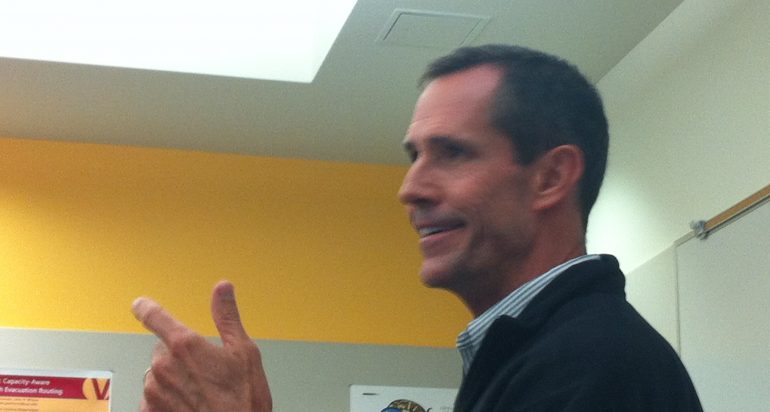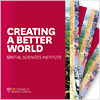COL [R] Steven D. Fleming, SSI Professor of the Practice, shared some thoughts on how to live a purpose-driven life in the Spatial Sciences Institute Brown Bag series on Tuesday, November 15, 2016. Taking the title of his remarks from the title of Maria Schriver’s best-selling book Just Who Will You Be?, Professor Fleming gave a number of examples of experiences from his more than 30 years as a U.S. Army officer which have inspired him and helped shape his character.
Fleming continues to keep with him the two pieces of reading material which soldiers are authorized to take with them into combat: his “book of faith” and the U.S. Constitution, for which he was willing to sacrifice his life to defend. In his collection of “challenge coins” from fellow military colleagues, each “coin” represents a life lesson he learned from the individual who gave him that coin.
His small bookshelf in his office contains some of his favorite books. His real and virtual bookshelves include:
• A Message to Garcia by Elbert Hubbard, published in 1899, about the value of employees who take initiative to overcome obstacles and follow through completely on fulfilling assignments;
• The last lecture "Really Achieving Your Childhood Dreams" given by Carnegie Mellon Professor Randy Pausch at his university on September 18, 2007 before his death, in which he talked about his lessons learned and gave advice to students on how to achieve their own career and personal goals;
• Pulitzer Prize-winning author Anna Quindlen's commencement address to Villanova University on June 23, 2000;
• The commencement speech in 2005 by Steve Jobs at Stanford; and
• Former Secretary of State and GEN [R] Colin Powell’s 13 Rules of Leadership.
He also showed the assembled SSI faculty, staff and students two sealed envelopes which he also carried into combat with him and still keeps on him now. These envelopes – one addressed to his wife and the other addressed to his three sons – are intended to be delivered in the event of his death, and contain his letters to them with what he would want them to know from him, his “last testament,” not to dispose of worldly possessions, but to leave his family with his testament to his life.
He closed with the invitation to each of the attendees, “What would be in your letter? What is your testament of your life?”




